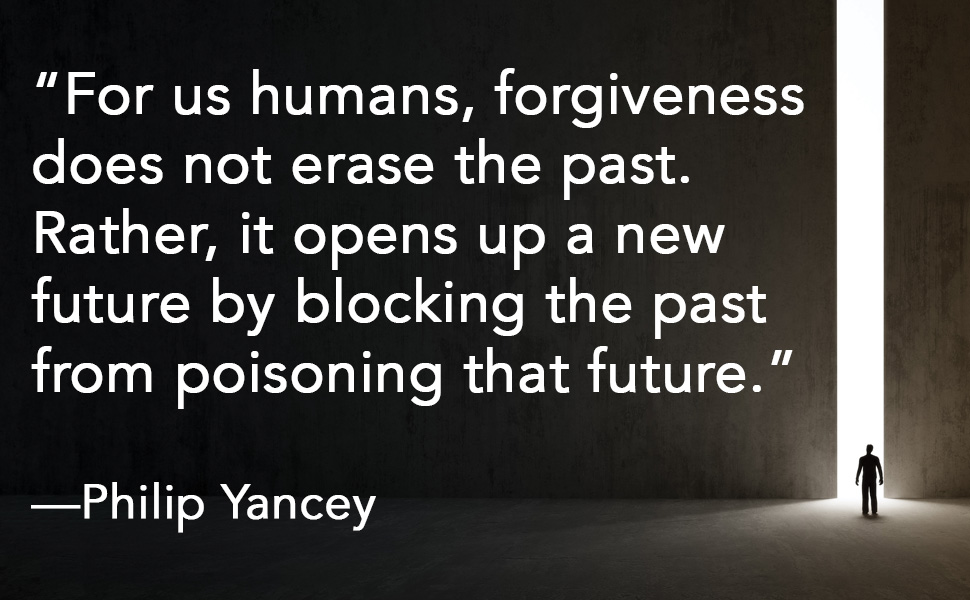Jesus breaks the “in group” bias of forgiveness for those like us and the “out group” fault-finding of those others.
In the presence of an enemy, will we…
• Attack, or attune?
• Escalate, or empathize?
• War, or reconcile?
It is clear how God responded…
“While we enemies, we were reconciled to God through the death of his Son” (Rom. 5:10).
This love for enemies—for those at war—is expressed, at the moment of Jesus’ death, as forgiveness.
For from the cross Jesus calls out, “Father, forgive them, for they do not know what they are doing” (Luke 23:34).
This is the demonstration of God’s love.
“Forgive them…”
Praying to the Father…
• Rather than demand his rights, Jesus asks that their sins to be removed.
• Rather than resentment, Jesus asks for reconciliation.
• Rather than hold a grudge, Jesus asks for them to receive grace.
Jesus prays for forgiveness.
He is embodying what he taught, practicing what he preached: “Love your enemies, do good to those who hate you, bless those who curse you, pray for those who mistreat you” (Luke 6:27-28).
“…For they don’t know what they are doing.”
Even in death, Jesus empathizes with his enemies, realizing they are out of their minds because they had flipped their lids.
The Romans and the Jews were caught in cycles of violence. They were reacting without reflecting. They were trapped in primal urges and survival instincts writ large as cultural oppression and collective trauma.
The soldiers, the priests, the crowds…they are all reacting from their collective social nervous system, activating implicit responses of fighting (the perceived threat of Jesus) and fleeing (responsibility for his death).
They were all trying to kill what they fear, not knowing that Jesus is really the author of life (Acts 3:15).
And in the midst of their social, collective, and traumatic dysregulation and disintegration, Jesus says, “Father, forgive them, for they do not know what they are doing.”
This is the demonstration of God’s love.

Cosmic Rupture and Repair
All of humanity, throughout time, has been ruptured by sin. Our relationships with ourselves, others, God, and the world are ruptured, distorted, and collapsing. Only our frenzied fight, flight, or freeze responses fend off total breakdown, delaying the inevitable.
But Jesus, as the demonstration of God’s love, coming when we were weak (lacking power), while we were warring (rebellious power), offers us forgiveness…
• for losing our minds,
• for doing what we don’t want to,
• for not doing what we want to do,
• for not even knowing what we are doing.
Within this cosmic rupture of sin, Jesus seek repair and offers us reconciliation. Taking our hostility toward ourselves, others, and God, onto himself—onto his body—Jesus reconciled everyone “through the cross, by which he put to death their hostility” (Eph. 2: 17).
This is the demonstration of God’s love.

On the science of forgiveness…
Lastly, Dr. Amrisha Vaish (University of Virginia) talks about the social and mental health benefits of forgiveness (learning again from children what matters)(see video).
Jesus has come to break the “in group” bias of forgiveness for those like us and “out group” fault-finding of those others— aprocess that triggers social fight and flight responses.
Instead of this typical dynamic, Jesus extends the “in group” bias all the way out to our enemies, something that we now know to be essential, but was revolutionary when Jesus enacted it.
And this is how God’s demonstrated God’s own kind of love, of love that is offered even to enemies.
Posts in “Unsystematic Thought’s on God’s Demonstration of Love” Series:
- From Abstraction to Demonstration of Love (#1)
- While We Were Still Weak (#2)
- God Proves to Us (#3)
- On God’s Unique Kind of Love (#4)
- While We Were Still Warring (#5)
- Enemy Love as Forgiveness (#6)

